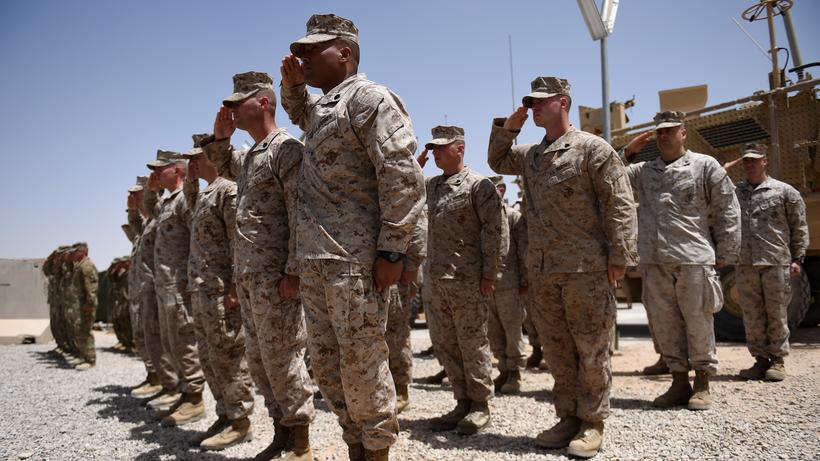
Sending more U.S. soldiers to Afghanistan will not be enough to achieve Trump’s idea of a victory. He shows little interest in rebuilding the country.
Military victories are the kind of victory Trump understands best. As simply as possible: We shoot, the others die, danger averted. This is how the U.S. president may imagine international operations conducive to national security, as in Afghanistan, where after 16 years of war nobody has won, least of all the United States.
Considering the lack of details on a future strategy, we have only Trump’s words to go by for the moment. At the beginning of the week, when he explained his view of the situation in the Hindu Kush and declared his intention to send even more U.S. troops to Afghanistan without mentioning concrete numbers, his goal became clear from this simple sentence: “We are not nation-building again. We are killing terrorists.” A statement that is out of touch with reality — things will have to go in a different direction.
General John “Mick” Nicholson Jr., who has been in command of U.S. forces in Afghanistan for about 18 months, had already recommended the troop increase during a Senate hearing in February to prevent the mission’s failure. In reply to the direct question, “Are we winning or losing?” the general said, “I believe we are in a stalemate.”
It is also the worst possible moment to abandon the country completely. Trump has clearly realized this as well, though he had often urged for a withdrawal, calling the mission “a complete waste.” There are, however, strong doubts about whether the expected steps will be sufficient to grant the U.S. the “complete victory” the president is now promising. According to General Nicholson, a couple thousand more soldiers would be needed just to maintain the status quo to some extent.
What does the victory Trump talks about look like?
It is easy to imagine what the defeat looks like. The Taliban and other radicals — including al-Qaida and the Islamic State — have long since regained momentum since three years ago when the international troops handed the responsibility for security to the Afghan government, and Trump’s predecessor Barack Obama wanted to expedite the withdrawal. Their territorial gains are not impressive at first glance, but they control more areas now than at any time after their loss of power in 2001. Without strengthened and lasting engagement from the U.S. (and others), the Afghan army will not be able to fight them forever.
This would be the defeat: The loss, after 16 years of war, of what little state has been built and the consolidation of the extremists. Even Trump does not want that, if for no other reason than because he hates nothing as much as he hates losing. Therefore, he has set no timetable for the end of the operation. Instead he wants to decide on a conditional basis; that is to say, the troops will be reduced only when the security improves.
But what does the victory the president talks about look like? The troop increase preached by Nicholson and others cannot by itself be sufficient enough to hinder the quick advance of the Taliban. And yes, Trump seems to have realized this too. A key pillar of the new strategy would be the use of “all instruments of American power — diplomatic, economic and military,” he said in his speech. One day, after an effective military effort, there would perhaps be the possibility of a political solution that would involve part of the Taliban. The U.S. would continue supporting the Afghan government. He also said that the U.S. is a friend and partner but that it does not want to tell the Afghan people how to live and what the government of their complex society should look like.
You must handle the rest
In saying this, Trump simply acknowledges an indisputable fact: Real progress in Afghanistan can only happen through the development of a stable state. How this fits with the simultaneous refusal of that very same nation-building remains his secret. The only fear is that the situation will take the turn of, “We help to kill more terrorists; handle the rest yourselves,” and that the chronically weak and corrupt structures of Afghan politics and the army will not do it. It is exactly the excessive weakness of the focus on the construction of a functional state that has brought to power those who profit from chaos and nepotism all over the land. There is a need for a strong effort by the Afghans themselves, but also for pressure from the outside.
Neighboring Pakistan will not be taken in by Trump’s demand that it do more to fight terrorism within its territory instead of continuing to offer shelter to the Taliban. The same goes for India, from whom the U.S. president asks for more support in Afghanistan’s development. Without diplomatic pressure and/or financial incentives, not much will change just because Trump says so. It appears though that, despite all his talk of victory, he is mostly acting out of fear of a final defeat. It would really take more than just soldiers to achieve a victory, but little is known about that other part of the strategy.

Leave a Reply
You must be logged in to post a comment.